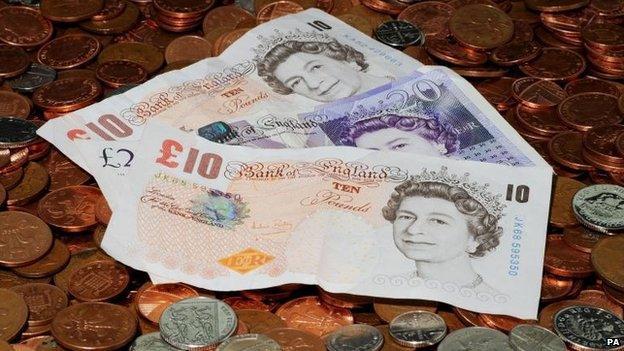Living standards not quite back to peak
- Published
- comments

Given that Labour has based so much of its attack on the government on the unprecedented slowness of the recovery in living standards following the Great Recession of 2008-09, Tories and Lib Dems are thrilled that the real or inflation-adjusted income of a typical household is now back to where it was in 2007-08, according to the IFS.
That said, they are probably less joyful that this measure of living standards is still 2% below its all-time peak of 2009-10: incomes continued to rise during the recession when benefit and tax-credit payments outstripped inflation (simultaneously wreaking havoc on the public finances).
On the other hand, those statistics almost certainly don't describe your experience - because according to the IFS, the typical income of a 22-to-30-year-old has fallen 7.6% over the past six years, whereas that of someone over 60 has risen 1.8% (and there has been a gentle fall in living standards for those in the middle age group).
And the IFS says what is really striking is not that the typical or median real household income fell by 4% from its 2009-10 peak to a trough in 2011-12, but that subsequently the recovery has been a meagre 1.8% - compared with a 9.2% rise in the comparable first three years after the early 1980s downturn.
Has income inequality worsened?
The IFS is careful not to pin most of the blame for stagnating living standards on either the coalition government or on the preceding Labour one. It says that the prime culprit is the UK's hard-to-explain woeful productivity performance - lacklustre rises in the output of workers - which has meant that significant wage rises have been unaffordable.
What will be galling to both Labour and Tories is that the IFS also faces two ways on the contentious question of whether inequality of income has worsened since the Crash.
It says that if you assume that inflation is the same for all households, then income inequality is lower in 2014-15 than in 2007-08 - largely because of those steep rises in benefit payments in 2008 and 2009 that I mentioned earlier.
But in practice, it says, inflation between 2007 to 2010 was more pernicious for the poor than the rich, because of steep rises in food and energy prices which gobble up a disproportionately large portion of the incomes of the poorest.
So adjusting for this differential impact of inflation, income inequality barely changed in this period, the IFS argues.
Focus on better value
What is also striking is that consumption per head of consumables, like food and energy, was almost 4% lower towards the end of 2014 than at the beginning of 2008. British people have been very careful with their cash since the banking debacle,
Which is another way of looking at the rough old time experienced by Tesco and Morrison - and the surging fortunes of the likes of the Aldis and Lidls that are perceived to offer better value for money.
As for whether we can expect Mr Feelgood to be much in evidence in the run-up to the election, the IFS says that the median household income is rising 1.1% this year, a relatively fast rate (and the fastest rate since 2008-09).
And, stating the obvious perhaps, the IFS says that in the next Parliament, there are two main ways the new government will influence living standards - negatively via benefit and tax reforms deemed necessary to shrink the government's deficit, and positively through any policies that succeed in boosting productivity.